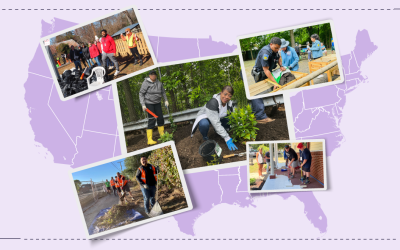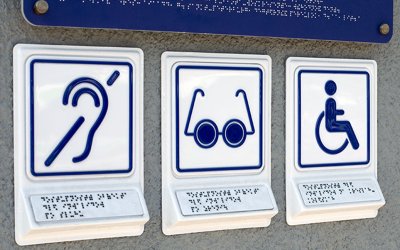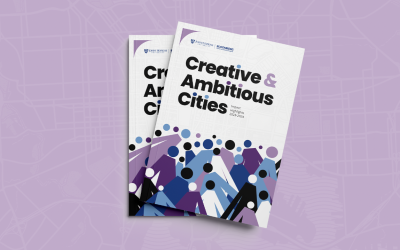Policies aren’t just words on paper. They are living frameworks that touch people’s lives every day.
I came to understand this deeply during the summer of 2025, when I worked in the Office of Sustainability, Resilience, and Community Transformation in the City of Newark, New Jersey, as a Summer Scholar through the Bloomberg Center for Public Innovation at Johns Hopkins University. Curious about how ideas become action and eager to tap the energy, history, and resilience of New Jersey’s largest municipality, I saw first-hand the patience, creativity, and persistence that are needed to shape public innovation and drive lasting change from inside city hall.
One of the most meaningful parts of my experience as a Summer Scholar was contributing to the Love Your Block, Newark! program. Love Your Block, a program of the Center that supports resident-led neighborhood revitalization projects in U.S. cities, is more than just a grant program: it’s a way for residents to take ownership of their neighborhoods through small-scale projects that beautify streets, strengthen pride, and build connections. As a Summer Scholar in Newark, which launched its first Love Your Block work in 2018, I helped update the 2020 Love Your Block ordinance to incorporate Newark’s priorities of addressing climate and health equity. I drafted new language that helps embed environmental justice, climate resilience, and public health in Love Your Block. This shift ensures that as beautification and community restoration projects clean up vacant lots and plant new trees and flowers, that they also create long-term benefits for families and communities facing the sharp edge of climate and health disparities.
Updating an ordinance is just one part of successful implementation. With my fellow Summer Scholar Anish Mudaliar, M.S. candidate in Engineering Management at the Johns Hopkins Whiting School of Engineering, we mapped the Newark resident’s journey of how neighbors discover Love Your Block, apply for grant funding, and navigate the process of implementing community projects. To understand the resident journey, we attended big community events to connect with residents and spent time across the city’s community gardens to talk with people, as well as worked with city staff throughout the process. That exercise revealed barriers that residents face: lack of clear information about the program and process, complicated forms, and unexpected delays. Seeing these hurdles helped us design a reimagined, simpler, more supportive grant process. In practice, this means shorter applications, feasibility workshops to build capacity, and structured check-ins between the city and community members to measure outcomes like increased community engagement or reduced heat exposure. In other words, our work to support Love Your Block Newark is helping the program become a platform that helps residents grow into neighborhood leaders, where small projects become starting points for long-term community ownership and collaboration.
My experience working on Love Your Block Newark—updating the ordinance and proposing program improvements—was especially valuable as a Summer Scholar in helping me quickly understand how to navigate relationships within city hall and with communities. This experience collaborating with stakeholders, along with my research skills as a Hopkins student, enabled me to contribute to a wide range of policy ideas in the city’s Office of Sustainability.
For example, the City of Newark produces significant organic waste, much of which ends up in landfills. I drafted the city’s first Compost Newark ordinance to align state recycling rules with community realities. The goal was to create legal clarity and provide education and tools so composting becomes accessible rather than burdensome. With careful implementation, this ordinance will divert waste and support urban agriculture and reduce emissions, linking climate action with local food security.
Extreme heat offered yet another test. For Newark, resilience meant both technical and human solutions. I worked on a cool roofs policy that reduces building temperatures, cuts utility bills, and can train local workers in installation. Alongside that, I helped design Be a Buddy Newark, a program in which volunteers check on vulnerable residents during heat waves—a small act with potentially life-saving impact. We even explored expanding it into a year-round network that could respond to cold snaps and flooding, embedding resilience into the fabric of community life.
Finally, clean energy integration tied everything together. From electric vehicle (EV) fleet transition to community solar, Newark faces hurdles of infrastructure, equity, and regulation. My role was to research tools such as EV-ready building codes, consumer protections, and financing models which could give the city more leverage while ensuring low- and moderate-income households benefit from the transition.
Together, these summer projects shaped not only Newark’s policies but also my own growth as a policy practitioner. I honed my ability to write ordinances with both technical precision and human empathy. I learned to ask: how will this policy feel to the person trying to apply it on the ground? And I saw first-hand how sustainability work is not only about environmental metrics but also about trust, equity, and participation.
Reflecting on the summer, what stands out most is the interplay between vision and execution. Newark is ambitious about climate resilience and leveraging public innovation, and grounded in the practical realities of city life. My experience as a Summer Scholar gave me a front-row seat to the balancing act of government: advancing big ideas while meeting everyday needs. As I continue my studies and career, I carry forward the lesson that durable change depends on listening first, designing with people at the center, and building systems resilient enough to serve both today’s challenges and tomorrow’s opportunities.




